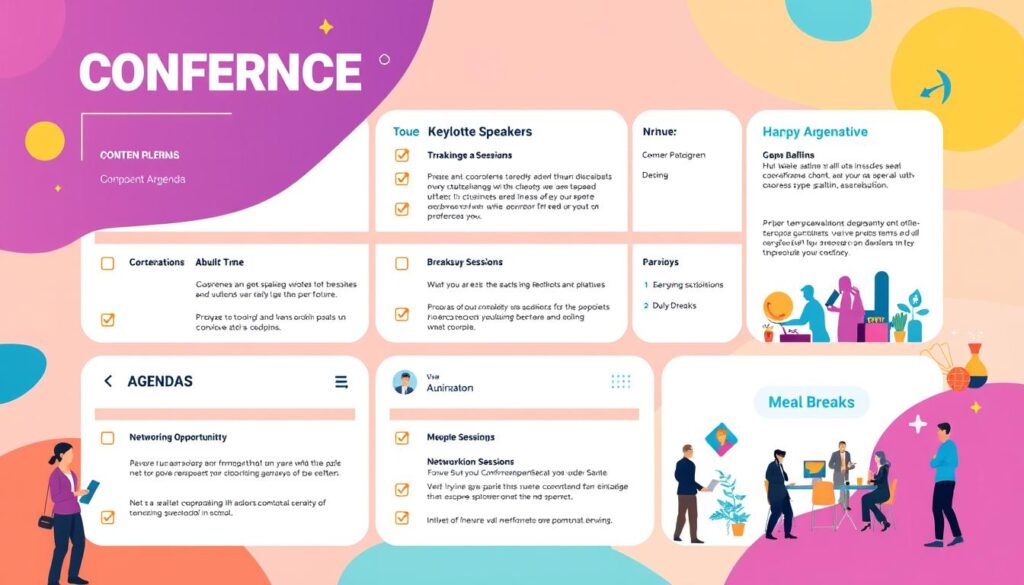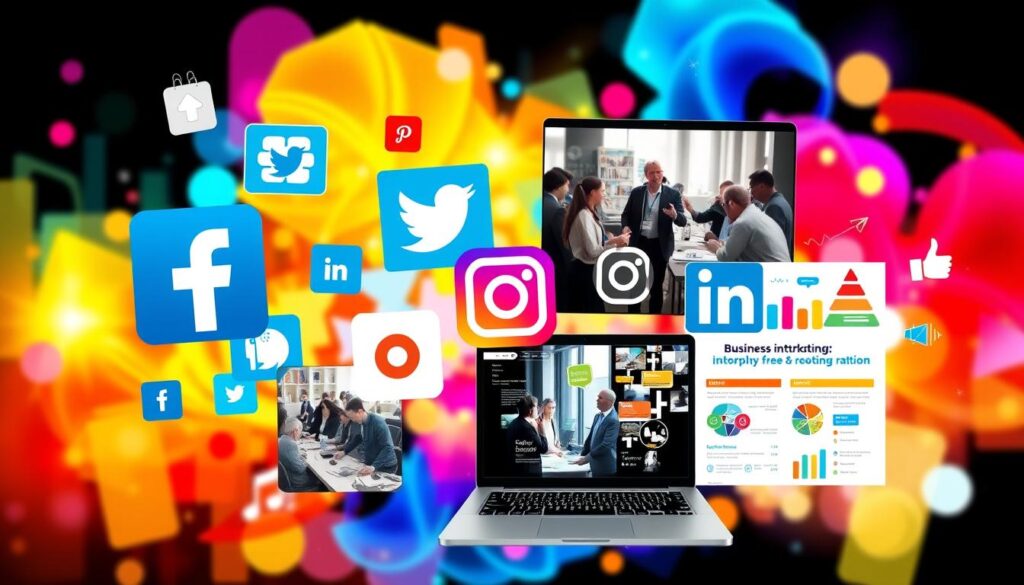תכנון כנס עסקי דורש תשומת לב רגישה לפרטים. כל נקודה, מהגדרת המטרות ועד בחירת המקום, דורשת שקיפות והתבוננות. מדריך זה מציע אסטרטגיות להפוך את הכנס הבא שלך למצלחה.
אנו נכסה על אלמנטים מרכזיים כמו הגדרת מטרות וזיהוי הקהל היעד שלך. תלמד כיצד לבחור את המקום המושלם וליצור סדר יום מעניין. נחקור גם אסטרטגיות שיווקיות אפקטיביות כדי למשוך את המשתתפים הנכונים.
מסקנות מרכזיות
- הגדר באופן ברור את המטרות והמטרות של הכנס כדי לוודא שהוא מתאים למטרות העסק שלך.
- זהה את הקהל היעד שלך והתאם את חוויית הכנס לצרכיהם והעדפותיהם הספציפיות.
- בחר מקום שיכול לארח את מספר המשתתפים שלך ואת דרישות הלוגיסטיקה בזמן שמספק סביבה נוחה ומעוררת השקפה.
- פתח תוכנית שיווק מקיפה כדי לקדם את הכנס ולמשוך את המשתתפים הנכונים.
- העדיפות נתונה ליצירת סדר יום מעניין ואינטראקטיבי שישמור על מעורבות המשתתפים לאורך האירוע.
הבנת מטרה ויעדי הכנס שלך
תכנון כנס מוצלח מתחיל עם הגדרת מטרה ויעדי האירוע. זהו רגע לזהות את קהל היעד שלך ולהציב מטרות ספציפיות ומדידות. ההבנה הזו תנחה את כל ההחלטות בתהליך התכנון שלך.
הגדרת קהל היעד שלך
ידע על קהל היעד שלך הוא מרכזי ליצירת תוכן ופורמט מעניינים. חשוב לשקול גורמים כמו תעשיה, תפקידים בעבודה ורמות גיליון. זה יעזור להתאים את האירוע לצרכי ולעניינים של המשתתפים.
הצבת מטרות ברורות ותוצאות מבוקשות
הצבת מטרות ברורות ומדידות המתאימות למטרת האירוע שלך. היעדים עשויים לכלול שיפור בידע בתחום או קידום רשתות. יש להציב KPIs למעקב אחר הצלחת הכנס והגעת לתוצאות הרצויות.
| מטרת הכנס | קהל יעד | מטרות הכנס | יעדי תכנון האירוע |
|---|---|---|---|
| שיפור ידע ענף ושיטות מובילות | מקצוענים בענף השיווק והפרסום |
|
|
"להגדיר את המטרה והיעדים של הכנס שלך היא היסוד לכל החלטות התכנון הבאות. בלעדי חזון ברור, זה בלתי אפשרי ליצור אירוע שישפיע באופן אמיתי ויזכיר."
הבנה ברורה של מטרת הכנס שלך, הקהל והמטרות היא חיונית. זה מאפשר לך ליצור תוכנית אסטרטגית. זה מבטיח שהאירוע יספק ערך וישיג תוצאות מועדפות.
בחירת המקום והתאריך הנכונים
בחירת המקום והתאריך היא חיונית לכנס עסקי מוצלח. תהליך בחירת המקום כולל בדיקת מיקומים בהתבסס על גודל, תשתיות ונגישות. תכנון תאריך האירוע דורש חשיבה זהירה כדי להבטיח נוכחות מקסימלית והתערבות.
הערכת מקומות אפשריים
כדי למצוא את המקום הטוב ביותר לכנס, עליך להרצות מחקר מעמיק וביקורות באתר. צור רשימה של מקומות שתואמים את גודל הכנס שלך, התקציב והצרכים הלוגיסטיים.
שקול גורמים כגון מיקום גיאוגרפי, גודל המקום וקיבולת. בדוק את השירותים הנחוצים כגון חדרי פגישות, ציוד אודיו ויזואלי ואינטרנט מהיר. חפש אפשרויות קייטרינג ואירוח עבור המשתתפים שלך.
בקר במקומות אפשריים כדי לקבל הרגשה ממוקדת. השווה בין היתרונות והחסרונות של כל אפשרות כדי לקבל החלטה מושכלת.
- מיקום גיאוגרפי: האם המקום נגיש בקלות למשתתפים שלך, עם אפשרויות תחבורה נוחות?
- גודל המקום והקיבולת: האם המקום יכול לארח בנוחות את מספר המשתתפים שצפית להגיע?
- שירותים וטכנולוגיה: האם המקום מציע את הפקודות הנחוצות, כמו חדרי פגישות, ציוד אודיו ויזואלי ואינטרנט מהיר?
- קייטרינג ואירוח: האם קיימים אפשרויות אכילה ואירוח באתר או בקרבת מקום עבור המשתתפים שלך?
| קריטריוני הערכת המקום | מקום A | מקום B | מקום C |
|---|---|---|---|
| מיקום | במרכז העיר | בסבורבים | ליד שדה התעופה |
| קיבולת | 500 משתתפים | 300 משתתפים | 800 משתתפים |
| שירותים | טכנולוגיים, שירותי קייטרינג במקום | בסיסיים, אפשרויות אכילה בקרבת מקום | נרחבים, כולל אירוח |
| נגישות | תחבורה ציבורית, חניה מוגבלת | חניה רחבה, תחבורה ציבורית מוגבלת | מחובר היטב, עם שירותי שאטל |
| עלות | $25,000 | $18,000 | $35,000 |

תכנון כנס: יצירת סדר יום מעניין
סדר יום מעניין לכנס הוא חיוני לשמירה על עניין המשתתפים. עיצוב סדר יום ותכנון ישיבות מקפיד יכולים לשפר באופן משמעותי את זרימת האירוע. בחירת דוברים אסטרטגית משמשת גם היא תפקיד מרכזי בשיפור חוויית המשתתפים.
התחילו על ידי עיצוב ציר הזמן של הכנס. כלול מגוון של דברי פתיחה, דיוני פאנל, סדנאות והזדמנויות לרשתות. סדרו את הישיבות בדרך שתיצור ריתם טבעי עבור המשתתפים.
וודאו עברות חלקות בין הפעילויות. זה עוזר לשמור על עניין ומונע עייפות בקרב המשתתפים.
- בחרו דוברים שיכולים להעביר תוכן מעניין ומרתק המותאם למטרות הכנס שלכם.
- הוסף רכיבים אינטראקטיביים כמו ישיבות שאלות ודיונים קטנים כדי לעודד השתתפות קהלית.
- אפשר דיונים רשתיים מספיקים כדי שהמשתתפים יוכלו להתחבר ולשתף רעיונות.
- השתמש במדיה מרובת ערוצים ועזרים חזותיים כדי לשפר הרצאות ולשמור על מעורבות חזותית של המשתתפים.
סדר יום מעוצב היטב מעדיף עיצוב סדר יום לכנס ותכנון ישיבות מקורי. זה גם מתמקד בבחירת דוברים אסטרטגיים ובתהליך מאורגן של זרימת האירוע.
הגישה הזו עוזרת ליצור כנס שמשך והשראה למשתתפים לאורך האירוע.

קידום ושיווק של הכנס שלך
קידום יעיל הוא מפתח להגברת הנוכחות ויצירת תחושת תהום. באמצעות
מדיה חברתית ופלטפורמות דיגיטליות יכולות לעזור להגיע לקהל היעד שלך. אסטרטגיה מקיפה צריכה לכלול קמפיינים באימייל, מודעות ממוקדות, ושותפויות עם משפיעים.
משיכת מוטב במדיה חברתית ופלטפורמות דיגיטליות
פלטפורמות מדיה חברתית מציעות כלים חזקים לקידום. השתמשו ב-טוויטר, לינקדאין, ו-אינסטגרם כדי לשתף עדכונים ותוכן מאחורי הקלעים. צרו האשטג של האירוע כדי להרחיב את הגעתכם ולבנות קהילה.
חקרו גם טקטיקות שיווק דיגיטלי נוספות. נסו ידיות באימייל ומודעות ממוקדות ב-פייסבוק וב-גוגל אדס. שתפו פעולה עם משפיעים בתעשייה ובלוגרים כדי לקדם את ה-כנס שלכם בצורה יעילה.
פיתוח אסטרטגיה שיווקית מקיפה
כדי לשפר את פרסום האירוע ואת קידום הכנס שלכם, צרו אסטרטגיה מקיפה. ערבבו בין טקטיקות מקוונות ולא מקוונות להשפעה מרבית. הנה כמה גישות יעילות:
- יצירת אתר אירועים מיוחד עם מידע על רישום, דוברים וסדר יום
- שימוש בשיווק באמצעות דואר אלקטרוני כדי להגיע לקהל היעד שלך ולשמר עליהם מעודכנים לגבי עדכונים
- שיתוף פעולה עם שותפי תעשייה וספונסורים כדי לקדם את האירוע ביחד
- שימוש בפרסומת ממומנת ברשתות חברתיות ובמנועי חיפוש כדי להגיע למשתתפים פוטנציאליים חדשים
- יצירת תחושת תהום דרך מסמכי עיתונות, פניית למדורי תקשורת וכתיבת פוסטים בבלוגים אורחים
גישה מרובת פנים לקידום כנסים ולשיווק דיגיטלי יכולה להוביל לרישומים ביעילות. האסטרטגיה הזו מבטיחה אירוע מוצלח ומשובץ היטב. כיוונו את הטקטיקות שלכם כך שתגיעו לקהל המטרה שלכם.

| ערוץ שיווק דיגיטלי | יתרונות פוטנציאליים | שיקולים מרכזיים |
|---|---|---|
| מדיה חברתית |
|
|
| שיווק באמצעות דואר אלקטרוני |
|
|
| פרסום בתשלום |
|
|
מסקנה: הבטחת אירוע מוצלח ומיוחד
תכנון וביצוע זהים חיוניים לקיום כנס מוצלח. דגש על מטרות ברורות ועל קהל היעד שלך. בחר במקום הנכון וצרף סדר יום מעניין לחוויה מיוחדת.
קידום יעיל הוא חיוני להגברת הנוכחות. השתמש ברשתות חברתיות ופלטפורמות דיגיטליות כדי להגיע לקהל שלך. צור תחושת תרגוש ותהייות לקראת האירוע.
המפתח להצלחה הוא להסתגל לשינויים ולאסוף משוב. שפר את תהליך התכנון שלך באופן רציף. שלב שיטות תכנון לכנסים כדי לחרוג מהציפיות.
תקדים בראש ובראשונה בהצלחת האירוע ובחווית המשתתפים. הגישה הזו תעזור לך למסור כנס שישאיר רושם אינסופי על המשתתפים.
